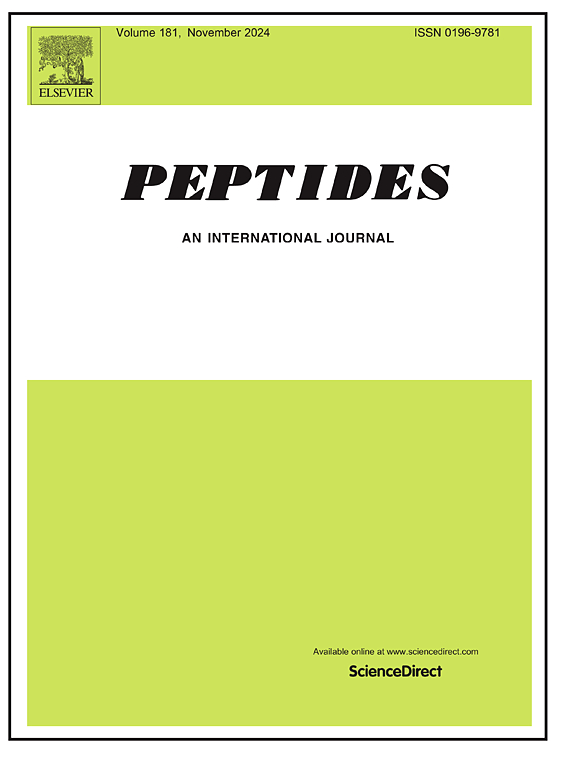Irisin prevents visceral hypersensitivity and colonic hyperpermeability in a rat model of irritable bowel syndrome
IF 2.8
4区 医学
Q3 BIOCHEMISTRY & MOLECULAR BIOLOGY
引用次数: 0
Abstract
Visceral hypersensitivity and impaired gut barrier function, accompanied by minor inflammation, are crucial components of the pathophysiology of irritable bowel syndrome (IBS). Research has demonstrated that corticotropin-releasing factor (CRF) and toll-like receptor 4 (TLR4) signaling mutually activate to produce proinflammatory cytokines, which modulate these gastrointestinal changes. Irisin, a myokine, has been shown to inhibit TLR4-proinflammatory cytokine signaling, thereby improving inflammation driven by obesity and metabolic syndrome. Based on this, we hypothesized that irisin could improve visceral hypersensitivity and impaired gut barrier function induced by lipopolysaccharide (LPS) or CRF (IBS rat models), and tested this hypothesis. The visceral pain threshold, triggered by colonic balloon distention, was assessed by electrophysiologically monitoring abdominal muscle contractions in male Sprague-Dawley rats. Colonic permeability was evaluated by measuring the amount of Evans blue dye absorbed within the colonic tissue. Intraperitoneal irisin prevented LPS-induced visceral hypersensitivity and colonic hyperpermeability in a dose-dependent manner. Irisin also prevented CRF-induced gastrointestinal alterations. The beneficial effects of irisin in the LPS model were reversed by compound C, an AMP-activated protein kinase (AMPK) inhibitor; NG-nitro-L-arginine methyl ester, a nitric oxide (NO) synthesis inhibitor; sulpiride or domperidone, a dopamine D2 receptor antagonist; atropine and intracisternal injection of SB-334867, a selective orexin 1 receptor antagonist. Overall, these findings suggest that irisin improves visceral sensation and colonic barrier function through AMPK, NO and dopamine D2, cholinergic and brain orexin signaling in IBS model. Thus, irisin may be a promising therapeutic agent for treating IBS.
鸢尾素预防肠易激综合征大鼠模型的内脏过敏和结肠高渗透性
内脏过敏和肠道屏障功能受损,伴随着轻微的炎症,是肠易激综合征(IBS)病理生理学的重要组成部分。研究表明,促肾上腺皮质激素释放因子(CRF)和toll样受体4 (TLR4)信号相互激活,产生促炎细胞因子,调节这些胃肠道变化。鸢尾素是一种肌因子,已被证明可以抑制tlr4促炎细胞因子信号,从而改善肥胖和代谢综合征引起的炎症。基于此,我们假设鸢尾素可以改善脂多糖(LPS)或CRF (IBS大鼠模型)引起的内脏超敏反应和肠道屏障功能受损,并对这一假设进行了验证。通过电生理学监测雄性Sprague-Dawley大鼠腹部肌肉收缩,评估由结肠球囊膨胀引发的内脏痛阈。通过测定结肠组织内埃文斯蓝染料的吸收量来评估结肠通透性。鸢尾素以剂量依赖性的方式阻止lps诱导的内脏超敏反应和结肠高渗透性。鸢尾素还能防止crf诱导的胃肠道改变。鸢尾素在LPS模型中的有益作用被化合物C逆转,化合物C是一种amp激活的蛋白激酶(AMPK)抑制剂;NO合成抑制剂ng -硝基- l -精氨酸甲酯;舒必利或多潘立酮,多巴胺D2受体拮抗剂;阿托品和腹腔注射SB-334867,一种选择性食欲素1受体拮抗剂。综上所述,这些发现表明鸢尾素在IBS模型中通过AMPK、NO和多巴胺D2、胆碱能和脑促食欲素信号通路改善内脏感觉和结肠屏障功能。因此,鸢尾素可能是一种很有前途的治疗肠易激综合征的药物。
本文章由计算机程序翻译,如有差异,请以英文原文为准。
求助全文
约1分钟内获得全文
求助全文
来源期刊

Peptides
医学-生化与分子生物学
CiteScore
6.40
自引率
6.70%
发文量
130
审稿时长
28 days
期刊介绍:
Peptides is an international journal presenting original contributions on the biochemistry, physiology and pharmacology of biological active peptides, as well as their functions that relate to gastroenterology, endocrinology, and behavioral effects.
Peptides emphasizes all aspects of high profile peptide research in mammals and non-mammalian vertebrates. Special consideration can be given to plants and invertebrates. Submission of articles with clinical relevance is particularly encouraged.
 求助内容:
求助内容: 应助结果提醒方式:
应助结果提醒方式:


